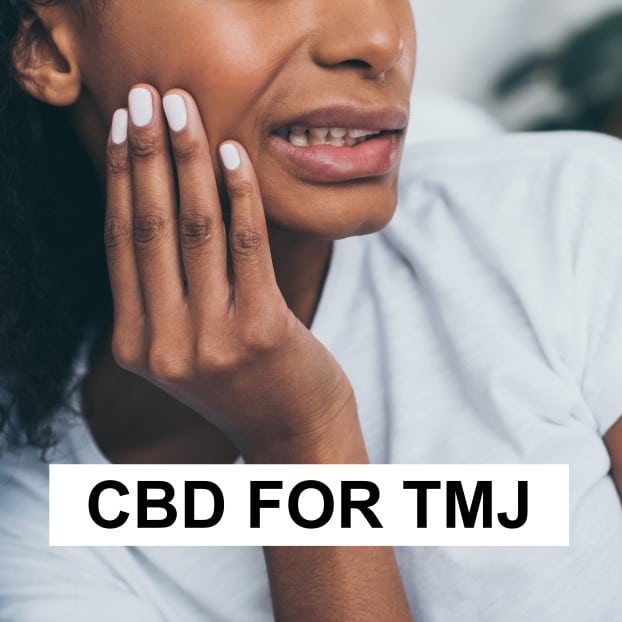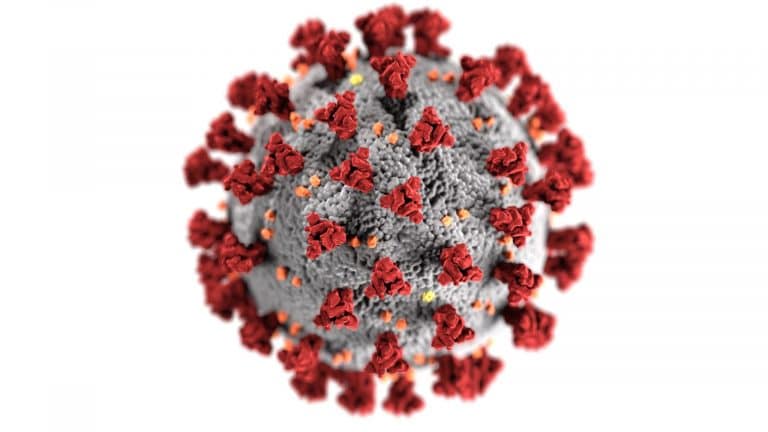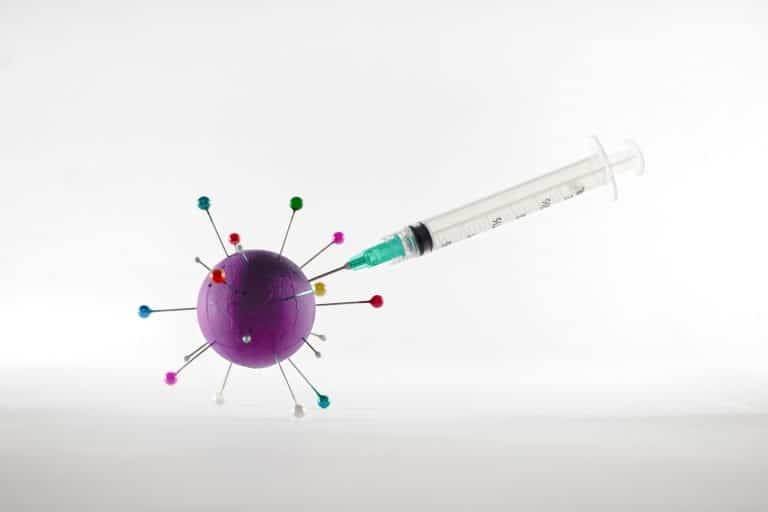CBD For TMJ – Will It Make Your Jaw Hurt Less?

Posted on May 14th, 2021
TMJ is an abbreviation for the temporomandibular joint. It works like a sliding hinge that connects the jawbone to the skull. Everyone has two joints, each placed on either side of the jaw. TMJ disorder is a condition that causes pain in your jaw joint and in the muscles responsible for controlling jaw movement. Besides the conventional treatments available, you now might be able to use CBD for TMJ as well. But before we jump into that, let’s learn a bit more about TMJ.
What Are the Symptoms of TMJ Disorders?
You can identify whether you are suffering from TMJ based on if you are experiencing the following:
- Pain and tenderness in the jaw.
- Aching pain in and around the ear.
- Pain in one or both of the temporomandibular joints.
- Difficulty or pain when chewing food.
- Locking of the joint making it hard to open or close the mouth.
- Aching facial pain.
TMJ disorders cause a grating sensation or clicking sound when you open your mouth or chew food. There is no limitation of movement or pain associated with the clicking jaw. In most cases, you don’t need treatment for a TMJ disorder.
What Happens to Your Jaw Mechanically When Experiencing TMJ Disorders?
TMJ is one of the most used joints in your body. It allows you to open and close your mouth. Also, the joints allow you to move your jaw from one side to the next. TMJ facilitates talking, eating, and facial expressions. It includes several types of muscles that work together to allow chewing, speech, and other facial movements. Some of the common issues that might affect TMJ disorder include the following.
- Grinding Teeth (Bruxism) – Most people grind their teeth at night when they are sleeping and wake up with tight and sore jaw muscles. With time, bruxism leads to the destruction of the tooth enamel, damage to the TMJ joint, and shifting of the gap between teeth.
- Headache and Jaw Disorders – TMJ disorders can lead to severe headache disorders. Often, you might experience misalignment or damage to the tendons, cartilage, and ligaments associated with jaw movements. With a severe TMJ disorder, you will be unable to move your jaw until the realigning the joint and might even require surgery.
- Poorly Fitting Nightguards – Nightguards are a corrective treatment for TMJ disorders. However, if they don’t fit properly, they might make things worse and cause the shifting of teeth.
How Do TMJ Disorders Develop?
The medical community is yet to determine the exact causes of TMJ disorders. However, some of the causes that contribute to muscle tightness and dysfunction include the following:
- Misalignment of the teeth or jaw.
- Trauma to the teeth or jaw.
- Teeth grinding (bruxism).
- Stress and anxiety.
- Poor posture.
- Orthodontic braces.
- Arthritis or other inflammatory musculoskeletal disorders.
- Excessive gum chewing.
Some of the known risk factors for TMJ disorders include the following:
- Extended poor posture on the neck and upper back muscles will lead to neck strain and abnormalities in the jaw muscle function.
- Increased stress leads to muscle tension and clenching of the jaw. Women aged 18 to 44 years of age have a high risk of developing TMJ disorders.
- Patients with chronic inflammatory arthritis have a high risk of developing TMJ disorders.
- People who experienced trauma to the jaw or developed poorly aligned teeth are at high risk.
- People with a genetic predisposition to pain sensitivity and subjected to increased stress responses are also susceptible.
Is TMJ Real?
Yes, there are have been millions of reported cases of TMJ disorders globally. Therefore, it is real, and anyone can suffer from it, especially if you are in any of the risk categories listed above. Watch out for any of the symptoms mentioned so you can diagnose a TMJ disorder rather early if you need to.
Treatments for TMJ Disorders
You need to get medical treatment if you have tenderness or persistent pain in your jaw. Also, you should visit a doctor if you can’t open or close your jaw completely. Your dentist or doctor should be able to discuss the causes and possible treatments for your TMJ condition. Note that, in most cases, TMJ disorders often go away without treatment.
Note that your doctor will do an examination of your jaw to identify any swelling or tenderness before diagnosing a TMJ disorder. Also, your doctor will rely on imaging tests such as X-rays, MRI, and CT scans of the jaw to identify any underlying problems. In general, TMJ disorders are often difficult to diagnose, and there are no standard tests yet in place to diagnose the condition.
However, if your symptoms are severe, some of the best treatment options include the following.
- Medications Your doctor can prescribe pain relievers and anti-inflammatories, low doses of tricyclic antidepressants, and muscle relaxants.
- Therapies – Occlusal appliances such as mouth guards or oral splints, physical therapy to strengthen the jaw, and counseling to help you habits that worsen the condition.
3. Surgery
If any of the treatment options above don’t work, your doctor will opt for surgical procedures such as the following:
Arthrocentesis is a minimally invasive procedure. Here, the doctor will insert small needles in the joint to irrigate the joint, thereby removing inflammatory byproducts and debris.
- Corticosteroid or botox injections in the joint will relieve the pain associated with TMJ disorders.
- TMJ arthroscopy where a small thin tube placed into the joint space followed by an arthroscope to relieve the pain.
- Modified condylotomy is also an option if the jaw locks itself when you are experiencing TMJ disorders.
- Open joint surgery, also known as arthrotomy, also becomes an option if any of the procedures above don’t guarantee relief with the TMJ disorder.
Note that, before undergoing surgery, you need to discuss the risks and benefits and the available options with your doctor, so you are fully aware.
However, there appears to be one chemical compound whose pain-relieving properties might lend a hand with TMJ. Its name is CBD, it is a cannabinoid, and we are about to learn how to use CBD for TMJ. But first, what is a cannabinoid?
What Are Cannabinoids?
These are substances that occur naturally within the Cannabis Sativa plant. There are 480 different types of compounds found in the plant but over 100 cannabinoids. The most common ones are THC, the psychoactive ingredient, and CBD or cannabidiol.
What Is CBD?
It is a chemical compound found in the Cannabis Sativa plant. Cannabidiol (CBD) is a naturally occurring substance that is often used in substances like oils and edibles to promote calmness. Note that CBD is not a psychoactive ingredient like THC, regardless of the fact that they are both cannabinoids.
What Are the Effects Of CBD?
Some of the possible effects of using CBD, whether as oils or edibles, include the following.
- Relieve pain associated with chronic illnesses or any other condition.
- Reduce anxiety and depression.
- Alleviates chemotherapy-related side effects such as nausea.
- It can reduce acne since it has anti-inflammatory properties. Also, it controls the overproduction of sebum in the sebaceous glands.
- Relieves symptoms associated with epilepsy, specifically the number and frequency of seizures.
- CBD may reduce blood pressure, thereby potentially preventing heart damage.
Keep in mind that CBD classifies as a safe substance for use and consumption. However, there are some side effects such as diarrhea, dry mouth, fatigue, and drowsiness. However, those only occur if you happened to ingest excessive amounts of it in a short time. Before taking CBD, make sure you tell your doctor about it because it can interact with other medications such as blood thinners. Your doctor should give you the go-ahead beforehand if you are not taking any other type of medication.
How Does CBD Work?
The human body features an endocannabinoid system that is responsible for regulating functions such as appetite, immune system response, sleep, and pain. The body produces endocannabinoids that are neurotransmitters capable of binding to the cannabinoid receptors found in the nervous system. CBD reduces chronic pain by interacting with the endocannabinoid receptor CB-2, which is in the immune cells.
Will CBD Get You High?
As mentioned above, CBD has a lot of benefits and also does not get you high. THC, another cannabinoid found in the Cannabis Sativa plant, is the psychoactive ingredient that does get you high. While some CBD products do have THC know that the amount is rather negligible at only 0.3%, which is not enough to get you high.
CBD For TMJ Does It Work?

Research reveals that at least 60 participants suffering from TMJ disorders who took CBD products actually experienced muscle and pain relief. Since CBD is capable of reducing inflammation and pain, it might soon become a regularly recommended treatment option for TMJ.
How Does CBD For TMJ Disorders Work?
As mentioned above, CBD interacts with the endocannabinoid receptors in the body, thereby providing relief from pain conditions, among other disorders. Therefore, if you are suffering from TMJ, CBD may work for you. CBD for TMJ disorders works by interacting with the receptors, thereby possibly relieving inflammation and other symptoms often associated with TMJ disorders.
What Is the Best Way to Apply CBD for TMJ?
If none of the TMJ treatments mentioned previously work for you or you are unwilling to resort to them, you should consider using CBD. It works effectively by relieving pain and inflammation in the joint. The best way to apply CBD to help with TMJ disorders is by using topical creams and oils. Gummies or edibles are not ideal because the chewing process might make the process more painful.






